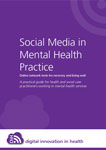New ebook for mental health practitioners on using social media to aid recovery and live well
21 March 2013 By Northern Lights

 Social Media in Mental Health Practice (2013) by Victoria Betton and Victoria Tomlinson
Social Media in Mental Health Practice (2013) by Victoria Betton and Victoria Tomlinson
Online network tools for recovery and living well
A practical guide for health and social care practitioners working in mental health services
Social Media in Mental Health Practice is a free e-book that provides social media guidance for health and social care practitioners working in mental health services, launched this week.
The e-book gives a broad overview of key social media that can be used to help people as part of their recovery and living well from peer support in online forums and using apps to send mental health advice direct to a mobile phone to using Pinterest for inspiration and Twitter to build social and support networks.
Written in plain English for ‘non-techies’ and packed with case studies, it describes how social media is already being used in day-to-day mental health practice, and backs this up with examples of good practice.
Victoria Betton, author and deputy director of strategy and partnerships for Leeds and York Partnership NHS Foundation Trust, said: “When discussing social media with mental health practitioners, I see a disconnect. Increasingly practitioners see the potential value of social media but many are fearful or don’t know where to start.
“A number are starting to use sites such as LinkedIn in their professional lives but not yet looking at how social media can form part of their toolkit to help people in their recovery.
“This is why we have written Social Media in Mental Health Practice, to capture, share and explain the many fantastic ways in which social media are already being used and give practitioners ideas and tips about how they might incorporate this knowledge into their day-to-day practice.”
Co-author of the ebook is Victoria Tomlinson, chief executive of Northern Lights PR and an award winning author of a number of ebooks on how to use social media.
Helen Bevan, Chief of Service Transformation at the NHS Institute for Innovation and Improvement, said: “This ebook sets out the kinds of opportunities that social media presents for health and social care practitioners working in mental health services.
“In our world of health and social care, demand is growing, care needs are becoming more complex and money is increasingly tight. We will struggle to deliver a future system of care for people with mental health difficulties using our previous thinking and methods of delivery. What strikes me about the case studies in this ebook is that they are powerful stories of innovation that show some new ways forward in order to get better outcomes for the people we serve. Social media has such a key role to play in service innovation.”
The authors stress the ebook is not a step by step, ‘how to’ guide on creating a LinkedIn account or how to tweet but they refer readers to a number of guides and websites that can help, as well as the professional guidelines on using social media.
Quotes from case studies in the ebook
Mark Brown, editor of One in Four a lifestyle magazine by and for people with mental health difficulties, points out how satisfying it is for someone who in everyday life would be seen as a ‘patient’, becoming the ‘expert’ when talking to others through social media – and both learning from the experience. He says: “I think mental health professionals have to keep up with the aspirations, ideas, hopes and ideals of the people they work on behalf of. Engaging with social media is part of that.”
An NHS Foundation Trust had to apologise to a blogger who wrote about her inpatient experience. Nurses found out about her blog, read it and confiscated her phone. The blogger, who writes under the name of ‘Little Feet’,wrote: “It became apparent in the complaint response that the trust did not have a policy surrounding the use of social media by inpatients. The great thing to come out of this is it has provided the trust a good ol’ prod and poke to get up to speed on the use of social media by patients.”
And Jonny Benjamin, who has used social media as part of his recovery journey, says: “I think mental health practitioners could encourage those with mental health problems to use social media in a similar way that I have… there is nothing quite like finding someone else you can relate to when suffering from mental illness.”
The ebook is available to download for free at http://www.leedspft.nhs.uk/professionals/digitalhealthinnovation
What people are saying
I really like the easy, clear and uncluttered style of it. If only all technology-related guides were written this way…emphasising what it’s really about, better communication between people, not messing about with IT for the sake of it.
Sheena Hastings, chief feature writer, Yorkshire Post
This is a really useful and readable guide to introduce people working in mental health to social media and to explain why not engaging isn’t really an option any more. It’s full of useful case studies with lots of hints and tips on how to get started and things to think of carefully around boundaries and ethics. Most importantly, it conveys really well the massive learning and sharing opportunities available and the fantastic mutual support people can gain by connecting online.
Niccola Swan, director, Leeds Mind
